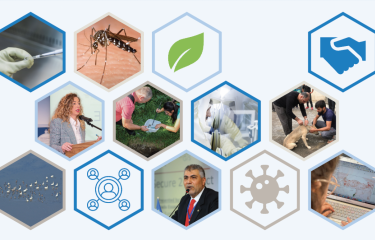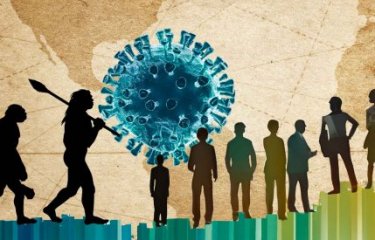According to the WHO recommendations, a multi-centre surveillance study has been implemented among healthcare workers in five African countries: Burkina Faso, Cameroon, Niger, Central African Republic and Madagascar. Coordinated by Institut Pasteur, this cohort study aims to identify the contamination risk factors and better understand the transmission/spread of the virus. The revue “International Journal of Infectious Diseases” published the first observations and recommendations.
Healthcare workers are on the frontline in the management of the epidemic, with different challenges that include a spectrum of responsibilities ranging from surveillance of cases to clinical management and care of patients. They are daily exposed to the risk of contagion and in case of infection can become potential spreaders. They also play an essential role in the implementation of adequate infection prevention and control measures in healthcare facilities.
The MediLabSecure project*, coordinated by Institut Pasteur Paris and supported by European partner Institutes (Laboratory for Urgent Response to Biological Threats (CIBU) at the Institut Pasteur, Istituto Superiore di Sanità (ISS) in Italy and Animal Health Research Center (INIA-CISA) in Spain) rapidly reacted implementing actions to support national surveillance capacities in the beneficiary countries and beyond.
A surveillance study among healthcare workers supported by the WHO
In this framework, and according to the WHO recommendations to establish a cohort study on healthcare workers, MediLabSecure has launched a multicentre surveillance and impact study in 4 African countries: Burkina Faso and Niger (members of the MediLabSecure network), Central African Republic and Madagascar (members of the Institut Pasteur International Network - IPIN). A fifth country, Cameroon (also member of IPIN), will participate in the study as well, through Pasteur Center in Cameroon that is directly supported by the Coronavirus Task Force of Institut Pasteur thanks to the public generosity.
With an objective of 80 to 200 enrolments per country, this study aims to identify the potential risk factors of infection among healthcare workers in contact with COVID-19 patients and better understand the key epidemiological characteristics in the dynamic of human-to-human transmission of the virus.
“We have included 122 healthcare workers, who are taking care of COVID-19 patients, coming from three hospitals in Antanarivo (Madagascar). We have followed these participants for 5 months after their inclusion in the study. During this time, we have collected demographical data, underlying diseases, data on the use of personal protection equipment (PPE) and clinical symptoms in case of disease.” Explains Dr Rindra RANDREMANANA, Head of Unit Epidemiology and Clinical Research of Institut Pasteur de Madagascar.”
“The study results will support Public Health decision-makers to propose guidelines to improve control measures leading hospitals to achieve internationals standards to stop the spreading of SARS-CoV-2 ” ends Dr Lazoumar Hamidou RAMATOULAYE, Head of Epidemiology Health-Environment-Climate unit of CERMES (Centre for Medical and Health Research) in Niger.
First recommendations already published
After only 3 months of follow-up, the study shows that SARS-CoV2 virus in these African countries infects almost 40% of healthcare workers. In comparison, the contamination rate in European countries among the same population group amounts to 20%.
In regards to these results, principal investigators of this study have decided to publish their first observations towards public decision-makers. There are twofold recommendations: increase the availability of PPE while ensuring sufficient quality; and strengthen training about control measures for reducing transmission by healthcare workers.
In this context, Project MediLabSecure made a free off-line training available to healthcare workers to develop proper reflexes to control and prevent themselves against the virus.
More about:
Rindra Randremanana, Ramatoulaye Hamidou Lazoumar, Mathurin Cyrille Tejiokem, Alexandre Manirakiza, Brice Wilfried Bicaba, Soatiana Rajatonirina, Serena Battaglia, Guillaume Pons, Vincent Richard on behalf of the COVER-HCW Consortium.
*this work is funded by the European Commission through the Instrument contributing to Stability and Peace and the CBRN CoE initiative.





